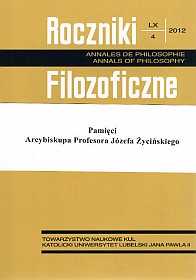Kościół a ewolucja - zasady dialogu
Abstrakt
Years ago Archbishop Prof. Józef Życiński put forward his own model of cognitive integration that takes into account the sacred, the beauty of nature, modern scientific discoveries as well as philosophical and theological theses. In this intellectual undertaking, bringing together in a single perspective poetic imagery and the Christian affirmation of nature, openness to new ideas of science and the quest for a new metaphysics, an important role was to be played by the Christian interpretation of Darwinism. The task still awaits realization. However, it seems that the Author’s death set in motion contrary tendencies. The article presents a brief overview of contemporary tensions between Darwinism and the Church in the context of the integration model proposed by Józef Życiński and signalizes these contrary trends. Outlining, as the title suggests, principles of dialogue, it points to modern man’s ambivalent attitude to cognition and nature as well as to the need to take into account the perspective of Fides et ratio, so vital in the teaching of Pope John Paul II, along with the so called criterion of “Christian rationality” that arises from it. Of help in this task may be further search for the truth about the world recorded in two books: the Book of Nature and the Book of Revelation as well as efforts to develop appropriate methodology of reading them.
Bibliografia
Artigas M., Glick T. F., Martínez R. A., Negotiating Darwin: The Vatican Confronts Evolution, 1877-1902 (Medicine, Science, and Religion in Historical Context), Johns Hopkins University Press, Baltimore 2006.
Chaberek M., Kościół a ewolucja, Wyd. Fronda, Warszawa 2012.
Euvé F., Darwin i chrześcijaństwo, Wyd. WAM, Kraków 2010.
Heller M., Ewolucjonizm i Święte Oficjum na przełomie XIX i XX w., w: M. Heller (red.), Prace Komisji Polskiej Akademii Umiejętności „Fides et ratio”, t. 1, Kraków 2010, s. 51-63.
Haught J. F., Odpowiedzi na 101 pytań o Boga i ewolucje, Wyd. WAM, Kraków 2003.
Jaromi S., Ecologia humana – chrześcijańska odpowiedź na kryzys ekologiczny, Wyd. Bratni Zew, Kraków 2004.
Krauze F., Jedna prawda, dwie księgi, Wyd. WAM, OBI, Kraków 2008.
Słomka M., Straszenie Darwinem, Tygodnik Powszechny, nr 11 z 13 marca 2005 r.
M. Słomka, Ewolucjonizm chrześcijański a pochodzenie człowieka, Wyd. Gaudium, Lublin 2004.
Życiński J., Ułaskawienie Natury, Wyd. Znak, Kraków 1992.
Życiński J., Na zachód od domu niewoli, Wyd. W drodze, Poznań 1997.
Życiński J., Inspiracje chrześcijańskie w powstaniu nauki nowożytnej, RW KUL, Lublin 2000.
Życiński J., Bóg i ewolucja. Podstawowe pytania ewolucjonizmu chrześcijańskiego, Tow. Naukowe KUL, Lublin 2002.
Życiński J., Bóg i Stworzenie. Zarys teorii ewolucji, Wyd. Gaudium, Lublin 2011.
Copyright (c) 2012 Roczniki Filozoficzne

Utwór dostępny jest na licencji Creative Commons Uznanie autorstwa – Użycie niekomercyjne – Bez utworów zależnych 4.0 Międzynarodowe.





